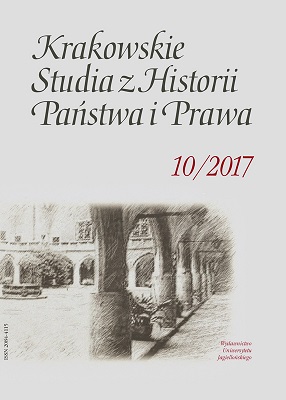Prace Komitetu Cywilnego Reformy nad nową regulacją małżeństw katolickich w 1814 roku
Work of Civil Reform Committee on New Regulation of Catholic Marriages in 1814
Author(s): Michał Gałędek, Anna KlimaszewskaSubject(s): Christian Theology and Religion, History of Law, Civil Law, 19th Century, Canon Law / Church Law, Sociology of Religion, Sociology of Law
Published by: Wydawnictwo Uniwersytetu Jagiellońskiego
Keywords: Catholic marriage; Kingdom of Poland; marriage law; ecclesiastical courts; codification; civil law; French civil code of 1804; modernization; national legal identity;
Summary/Abstract: As Henryk Konic observed in 1903 in his pioneering study of the marriage law in the Kingdom of Poland, a profound dispute on the nature of marriage split Polish society in the 19th century into two camps. In his words, “while one of these camps wanted to give to marriage exclusively religious character and remove the civil authorities from any participation or influence in the matrimonial sphere, the other camp was against such approach to this institution. – In short, the history of this dispute reflects the battle around the foundations of the family arrangement”. The aim of this study is to explore the roots of that dispute in the debates and the work of the 1814 Civil Law Reform Committee, chaired by Antoni Bieńkowski. The discussions in that forum, which included the outstanding Polish lawyers and dignitaries of the time, are of great importance for the understanding of the essence of the controversy that flared up after the collapse of the Napoleonic Grand Duchy of Warsaw. While the traditionalists wanted to bring back old Polish law, a party of moderate reformers headed by Antoni Bieńkowski sought to modernize of the Polish legal system. One of the key issues in the reformers’ draft legislation regarding marriage was the transfer of jurisdiction in matrimonial cases to ecclesiastical courts. On the whole, the abolition of provisions of the French civil code of 1804 and the redefi nition of matrimony as a sacrament were beyond question as was the general intention to do away with all of the French legislation. This article supplies ample evidence for the claim that the main idea guiding both the Committee members and Antoni Bieńkowski was for the new law to act as a safeguard against society’s inclination to dissolve the bond of matrimony for reasons that are not serious enough, i.e. that fail to meet the criteria for the annulment of marriage set by the laws of the church.
Journal: Krakowskie Studia z Historii Państwa i Prawa
- Issue Year: 10/2017
- Issue No: 3
- Page Range: 467-491
- Page Count: 25
- Language: Polish

